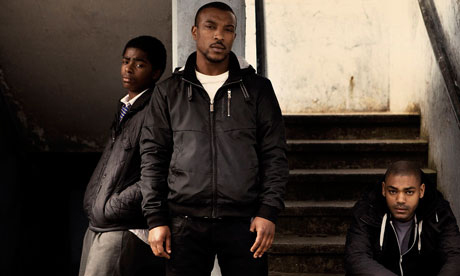Plot thickens in second series of Channel 4’s urban saga Top Boy

Ra’nell (Malcolm Kamulete), Dushane (Ashley Walters) and Sully (Kane Robinson), in Channel 4’s Top Boy. Photograph: Tristan Hopkins/Channel 4
Before the opening credits roll each Tuesday at 9pm Channel 4’s faceless announcer throatily introduces what is described as an “edgy series.” It’s “thrilling and raw,” we are assured. It’s “gritty.”
And yes, it is quite obviously those things – and it’s getting grittier and bloodier by the week. But as much as anything else, Top Boy is a damn good family drama.
Hackney Mayor Jules Pipe refused to allow the programme to be filmed on Hackney estates, arguing that may damage the borough’s reputation. But that hasn’t stopped the series from hitting home. Oppressive masses of bricks and mortar by day, a twinkling grid of yellow lights by night, Top Boy’s Summerhouse only reinforces the theme that estate life is simultaneously everywhere and nowhere.
The first series aired two years back. For two years before that, you may have seen the show’s writer Ronan Bennett, who has lived in Hackney for 25 years, in cafes on Mare Street interviewing ‘foot soldiers.’
The second four-part series now continues, raising again questions of realism, accuracy and obligatory comparisons with The Wire.
This story of Hackney’s drug gangs begs comparisons with the iconic HBO series set in Baltimore, which portrayed a city plugging along as a complex web of addiction, hierarchy, power, crime and cash self-perpetuates beneath the surface.
And that’s a shame, because while Top Boy is a good drama, The Wire can’t be matched — its mere existence demands epic complexity in all urban drug dramas to follow.
Before even considering creating The Wire, David Simon spent twelve years as a crime beat reporter at the Baltimore Sun in the 1980s and 1990s, when America’s so-called ‘War on Drugs’ was at its peak.
His writing partner, Ed Burns – not the one who’s married to Christy Turlington – served in the Baltimore Police Department for two decades.
This perfect marriage of insider knowledge from all angles, coupled with exquisite writing talent, is a gift from the TV gods.
The inspiration for Top Boy’s creator Ronan Bennett, on the other hand, went from the outside-in, emerging from a casual interest in drug deals he observed on Hackney’s streets.
Bennett spent two years interviewing Hackney gang members as part of his research for the show.
That’s a lot, but not that much.
In an interview with Channel 4, Bennett explains that while walking around his Hackney neighbourhood, he “turned a corner one day and saw little kids obviously doing a drug deal. And I just became interested. I went back to the same spot and watched off and on over the next week or so… and I thought: there’s something interesting here… I knew nothing at all… so the first thing was to familiarise myself with this world and get to know its nuances.”
Those nuances are best observed in the characters’ conflicted relationships with one another.
Drug-related violence is hard to watch, but Top Boy pulls at the heartstrings when, and only when, loved ones are at stake.
The drugs are a fast-track vehicle to the thrill of a narrative in which you never know who wants what from whom, nor why—Bennett observes this beautifully.
In the opening scene of the second series, top boy Dushane is taken down by police in front of his book-smart protege Michael; his new right-hand man Dris—the most violent in the group— looks deflated as he is arrested while his young daughter looks on from the school playground.
These scenes, where characters lose face in front of the ones they care about, tells the story of conflicted loyalties among family, biological and adopted, far more successfully than it dissects the labyrinthine complexity of the drugs trade.
Cheeky loner Jason is taken under the wing of head dealer Sully in a relationship that reads in equal parts as father-son (“have you been using the toothbrush I gave you?”) and strategic partnership (“Jason, I need you to do something for me…”). The script is flipped again when Jason steals a bag of “food”—and for the first time we see him bringing it home to his mum, as she lies helpless across her bed. “I love you, you know that?!” she says, jumping up to hug him as she lights up a sheet of foil.
The terror in the boy’s face is harrowing.
Friendships read as both real and fragile thanks to excellent acting by the core cast — but the other characters, unfortunately, have a tendency to descend into cliche.
The classic scar-faced villain to whom Dushane answers is predictable even down to the way he’s lit: always half in the dark. His gravelly voice and aura of pure evil are a bore to behold.
Dushane’s sexy tight-lipped solicitor, who swoops in when he’s arrested for murder, is just too perfect. From the moment she, unbelievably, accepts his offer for a drink, the whole set-up registers like the introduction to a role-play porn film – not least because eventually, they have sex. Luckily, the plot widens.
By the end of episode three, Top Boy is cracking open to reveal the rest of the urban economy, hungry for property investments, and apparently not too proud to take dirty money, as both Dushane and his solicitor-cum-girlfriend consider, over a coffee at E5 Bakehouse, teaming up with a property developer who wants to take over Summerhouse.
